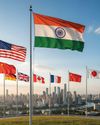Prøve GULL - Gratis
AGRICULTURE-THE BACKBONE OF THE AFRICAN ECONOMY
Extraordinary and Plenipotentiary Diplomatist
|January - February 2020
Agricultural production, of both crop and animal husbandry, has been part and parcel of the livelihoods of African societies since about 8,000 BCE (Before the Common Era).

Introduction and Background
The early focus was on the production of cereals (such as wheat, millet, and sorghum) and root crops (especially yams). There was also a transition towards the domestication of wild animals such as cattle, goats, sheep, and camels. Such transitions occurred in different phases in various parts of the continent. To date, agriculture remains the backbone of most sub-Saharan African economies, contributing an average of about 25 percent of the Gross Domestic Product (GDP).
Since its inception, agricultural production has had significant impacts on African economies. In the early years, the impacts include: (a) helped African societies to living in larger and more permanent settlements; (b) led to the significant increase in population, mainly due to the abundance of food supply; (c) the development of sophisticated tools, such as the stone axe; and (d) settled societies also began to require forms of social organization, cooperation, and planning. Furthermore, those that produced surplus food often had the liberty to do trade with other trading partners. Such activities often led to the establishment of administrative structures and authorities, now known as “chiefs,” in most parts of the continent.
Agricultural production and African economies during the colonial era
From the last quarter of the 19th century to the mid-1960s, most African countries as we know them today (except for Liberia), were placed under European colonial rule. The major European powers involved included Great Britain, France, Belgium, Portugal, and Germany. These were involved in the “the scramble and partition of Africa,” whose climax was the Berlin Conference of 1884-1885. It was in Berlin where the modern boundaries of the various states in the continent were drawn.
Denne historien er fra January - February 2020-utgaven av Extraordinary and Plenipotentiary Diplomatist.
Abonner på Magzter GOLD for å få tilgang til tusenvis av kuraterte premiumhistorier og over 9000 magasiner og aviser.
Allerede abonnent? Logg på
FLERE HISTORIER FRA Extraordinary and Plenipotentiary Diplomatist

Extraordinary and Plenipotentiary Diplomatist
Indian Strategies for Diversifying Export Markets Amid U.S. Tariff Pressures
India's rising economic power at the international level has presented challenges alongside opportunities to New Delhi.
5 mins
October 2025

Extraordinary and Plenipotentiary Diplomatist
Compulsions and Constraints before India's Foreign Policy
Although the present leadership in India clearly supports a multipolar world order, the US’s unparalleled ascendance with its self-obsessed approach in international relations has gravely hurt the national interests of poor and developing nations clubbed as the Third World, including India.
3 mins
October 2025

Extraordinary and Plenipotentiary Diplomatist
Responsible AI & Global Governance
India's Role amid BRICS, G20, and Global South Calls
7 mins
October 2025

Extraordinary and Plenipotentiary Diplomatist
INDIA AT UNGA-80 From Presence to Proposition
Every September, New York's diplomat-strewn avenues assume the cadence of high diplomacy.
6 mins
October 2025

Extraordinary and Plenipotentiary Diplomatist
Wadephul in India
Germany's India Outreach in a Fragmented Europe
4 mins
October 2025

Extraordinary and Plenipotentiary Diplomatist
RAPPROCHEMENT WITH CHINA
BEYOND THE BORDER - TRADE, COMMERCE, AND PEOPLE-TO-PEOPLE TIES
5 mins
October 2025

Extraordinary and Plenipotentiary Diplomatist
FTAs and Outward FDIS
Way forward to safeguard national interest in the Trump Era
4 mins
October 2025

Extraordinary and Plenipotentiary Diplomatist
What Leaders Must Do Now: Sir David King's Call for Climate Action
Sir David King is one of the world's foremost climate change leaders, renowned for his tireless work in confronting the global climate crisis. Serving as the UK Government's Chief Scientific Adviser from 2000 to 2007, he was instrumental in placing climate change at the top of the international agenda.
6 mins
October 2025

Extraordinary and Plenipotentiary Diplomatist
Safe Food, Secure Future
Globally, nearly 600 million people suffer from foodborne diseases, and more than 400,000 die each year from consuming unhygienic and unsafe food.
3 mins
October 2025

Extraordinary and Plenipotentiary Diplomatist
H-1B Visa Fee Surge & India's Tech Sector Exodus or Adaptation?
\"When the winds of change blow, some build walls, others build windmills.” It’s an old saying, but it fits quite well right now. With the U.S. suddenly raising H-1B visa petition fees to $100,000, India’s tech industry finds itself in the middle of a storm.
2 mins
October 2025
Translate
Change font size
